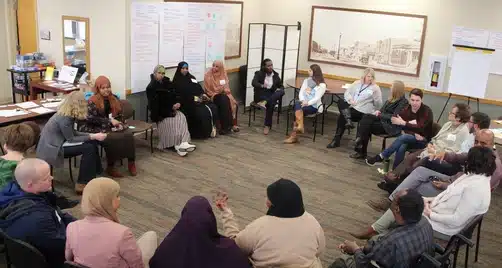Deliberating About Pressing Issues
September 22, 2021 by

Classroom discussion of current issues is one of the most powerful tools available to help young people develop the skills and knowledge required for democratic citizenship.1 There are many forms that such discussion can take, including short reactions to news articles, debates, and semester-long legislative simulations. While all of these forms have their place, one of the best things that schools can do, for multiple reasons, is to incorporate more deliberation.
What is Deliberation?
Deliberation is a specific form of discourse. In deliberation, participants explore a range of options, approaches, and priorities to determine the best resolution to a challenging political or social problem. In effect, deliberation is about answering the question, “What should we do?”2 In a deliberation, students approach an issue with a broad range of options and attempt to reach consensus.
| Discourse Type | Rationale | Sample Questions |
| Discussion: Open-ended conversation about a topic |
A discussion is a good way to introduce new ideas, brainstorm about an issue, and assess what information students already know before engaging in a debate or deliberation. Students will be open to new ideas and make connections to other knowledge, to current events, and to their personal lives.
|
Where do you get your ideas and information about immigration?
What are the benefits and drawbacks of immigration? What can we learn from history to help make decisions about immigration policy today? |
| Debate: Revolves around a central question with two or more predetermined options | A debate helps students better understand an issue, prioritize and evaluate various arguments, and practice public persuasive speaking.
Students will defend their positions with thoughtful and persuasive arguments. |
Should the United States provide a pathway to citizenship for young undocumented immigrants? Should the United States prioritize highly skilled immigrants? Should the United States expand access to legal immigration, restrict access, or keep the current levels?
|
| Deliberation: Participants exchange perspectives and ideas to reach consensus on an issue and identify solutions | Once students have a thorough understanding of an issue, a deliberation asks them to listen to each other, build consensus, and compromise to create a nuanced, complex proposal (or solution).
Students will consider many different positions, seek compromise with their peers, and ultimately attempt to reach consensus. |
What should be the highest priority of immigration reform efforts? What should the United States do about the estimated 11 million undocumented immigrants currently in the country? What actions, if any, should governments take to reform immigration?
|
Why Deliberation?
Deliberation about current issues presses students to seriously weigh the values and ideas of other participants. Deliberation has the potential to build empathy for other experiences and perspectives and to develop patience and openness with those with whom you might otherwise disagree.3 Because of the threat to our democracy posed by hyperpartisanship and polarization, building this empathy and openness is an important task for civic education.4
READ: “Anger, Fear, and Polarization” on the Current Issues Blog
Incorporating Deliberation
There are many ways to incorporate deliberation in the classroom.5 One approach, the structured academic controversy, calls on students to understand and defend multiple perspectives on the same issue. See an example from PBS NewsHour Extra here.
Another common example, the Socratic seminar, involves students taking ownership of the discussion and engaging with multiple sources to build expertise. While a structured academic controversy can be done fairly quickly, a Socratic seminar requires significant time to implement. See resources from Edutopia and Facing History & Ourselves for more guidance and examples of the Socratic seminar.
There are many other approaches to deliberation that range in time commitment between the structured academic controversy and the Socratic seminar. Fishbowl discussions and co-pilot discussions are also great approaches to help students explore multiple perspectives.
For a deeper dive into classroom deliberation, please join us for Close Up Conversations with Dr. Paula McAvoy, associate professor of social studies education at North Carolina State University. Dr. McAvoy will share insights from her recent research on how deliberation and consensus-building can help students feel respected when learning about controversial issues and engaging in structured political discussion. Click here to register for the webinar, which will take place on September 29 at 6:00 PM ET.
As always, we encourage you to join the discussion with your comments or questions below!
Sources
Featured Image Credit: Gustavus Adolphus College
[1] Diana Hess and Paula McAvoy: The Political Classroom: Evidence and Ethics in Democratic Education
[2] Peter Levine: https://peterlevine.ws/?p=13846
[3] Michael Morrell: Empathy and Democracy: Feeling, Thinking and Deliberation; Diana Mutz: Hearing the Other Side: Deliberative versus Participatory Democracy
[4] Teaching Channel: https://www.teachingchannel.com/blog/debate-deliberate; Newsweek: https://www.newsweek.com/hyperpartisanship-ruining-america-opinion-1629005
[5] Teaching Channel: https://learn.teachingchannel.com/video/student-centered-civic-discussion-deliberation







